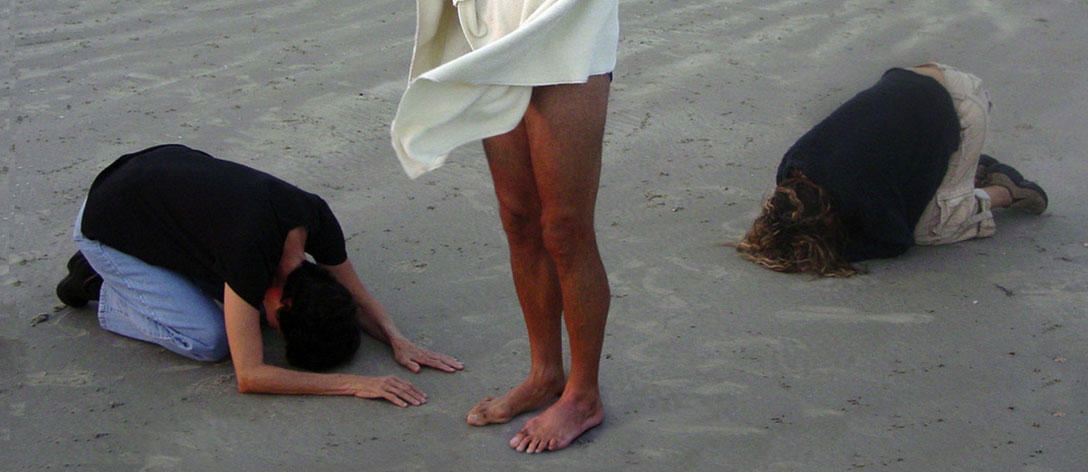Holy Hell
Jeremy Kinser
Sundance.org is dispatching its writers to daily screenings and events to capture the 10 days of festivities during the 2016 Sundance Film Festival in Park City, Utah. Check back each morning for roundups and insights into our experiences throughout the Festival.
Holy Hell
The riveting documentary Holy Hell sheds light on the inner workings of a mysterious spiritual community called Buddha Field, in which more than 100 young people lived a utopian existence under the grip of an enigmatic leader. The film premiered this week at Sundance in the U.S. Doc category to numerous standing ovations.
The non-fiction film is the first feature from director Will Allen, and while numerous other documentaries and narrative films have explored similar subject matter, Holy Hell offers a unique perspective. Allen was himself a member for more than two decades, having joined the group shortly after completing film school and was enlisted as the group’s official videographer. He recorded activities that usually centered on their leader they called The Teacher, or Michel. A Speedo-clad South American man who’d been a dancer and a background actor in films such as Rosemary’s Baby, Michel offered to show his followers the enlightenment his master had shown him.

Allen became so immersed in the cult that he recruited his two sisters, much to the consternation of their mother. His narrative speeds through the years, showing himself and other members living with a happiness that was elusive in the outside world. Eventually, members began to leave after questions of their teacher’s practices arose and dark secrets emerged, including his past work as a performer in gay porn and — most disturbingly — that he’d sexually abused many of his impressionable male followers.
When the film was announced as a Sundance premiere, most of the attention focused on the decision to keep Allen’s name anonymous until early January. After the screening, the soft-spoken Allen shared that this allowed him to complete work on the doc due to concern of interference by Michel and the people who still follow him. Allen revealed that he didn’t feel safe or comfortable while working on the film. He joked that there might even be current members in the audience. “If you’re here, stand up!” he insisted.
Asked if he felt an obligation to try to rescue others still under the spell of Michel (now based in Hawaii and still attracting new acolytes), Allen said that’s what he hopes to accomplish with his movie.
Rhadia Gleiss, one of several former Buddha Tribe members who attended the screening, added, “This film will be far more terrifying and damaging to him than any possible legal action that could ever happen. As much as he lies and constructs stories and manipulates people, there is no undoing this. It’s him speaking [on camera] so he can’t get away from it.”
Frank & Lola
Frank and Lola is a layered, stylish psychosexual that marks a striking feature debut from director Matthew M. Ross after making several acclaimed shorts. Programmer Trevor Groth introduced Ross as a longtime friend and noted that he’d always been impressed with the deep understanding of film and cinema exhibited by Ross in his former career as a film journalist. “You’ll see all of that diligence and talent on display tonight in his terrific feature debut,” Groth added.

Michael Shannon delivers a signature complex, brooding performance as Frank, a tough Las Vegas chef who, after falling for Lola (played with sultry persuasion by Imogen Poots), becomes engrossed in uncovering a mysterious episode in her past that takes him to Paris where he becomes involved in an even darker web of intrigue.
Asked during the Q&A that followed the screening how he came to select the two cities as his locations, Ross replied that he’d originally set half of the drama in New York. “I realized Las Vegas was the perfect setting,” he explained. “These were two lonely people living outside of where they want to be. You realize that Vegas has this half-mile strip, but it also has this other world there, which is dark and interesting and provocative.” D.P. Eric Koretz’s camerawork captures the noir-ish seductiveness of both metropolises.
Ross shared that his film was partly inspired by true events, which, considering some of the more sensational aspects of the tale, brought laughter from the audience. He clarified that he’d based the premise on “someone who’d gone through something very traumatic and hadn’t yet learned how to deal with a defective relationship they were in.”
He also revealed that it was his intent to make a real love story with real characters, adding that he also wanted to create “something of a fever dream or revenge fantasy… and I also wanted to make something in Paris.”




